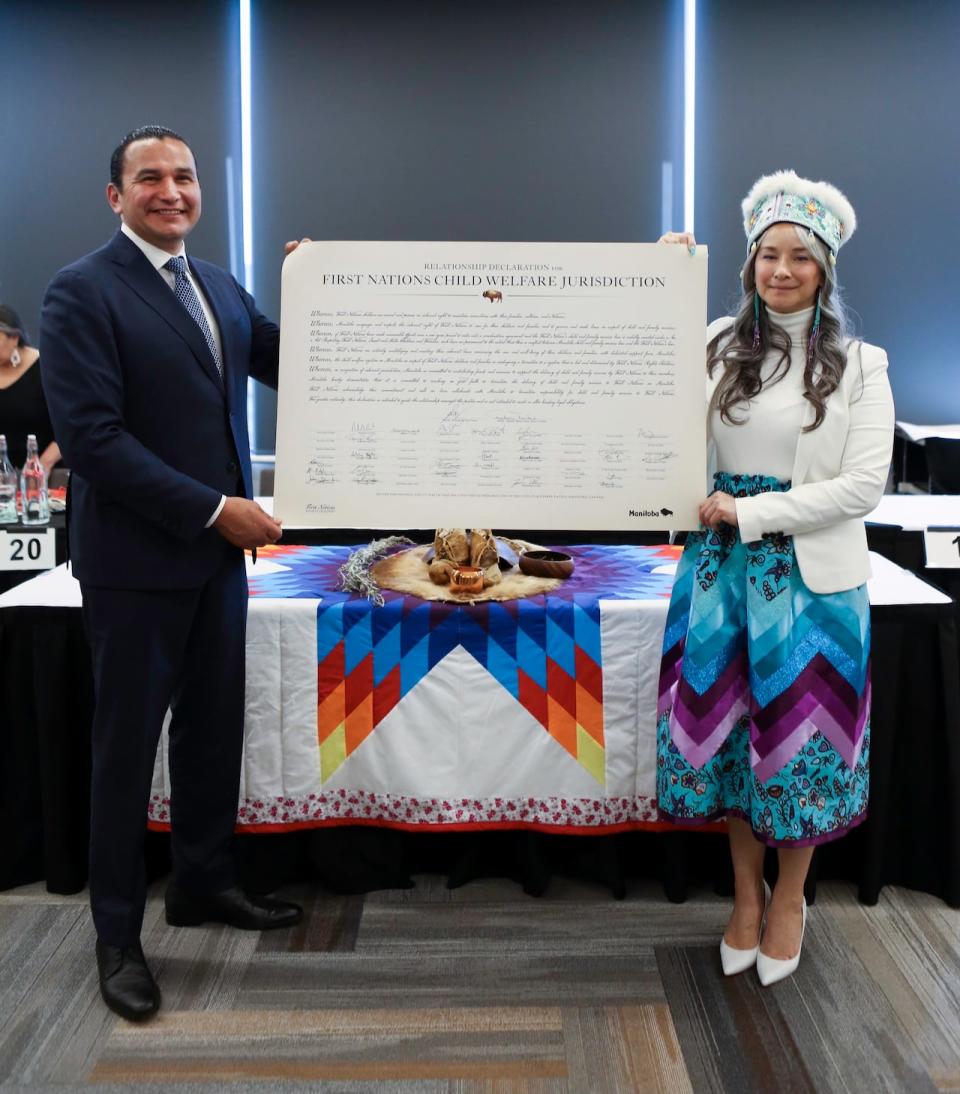'Staggering' rate of First Nations newborns involved in Manitoba child welfare system: study
A new study says child welfare has had 'an increasingly widespread presence' in the lives of First Nations newborns in Manitoba over the last couple decades, and its lead author says urgent change is needed.
Published Wednesday, the study looking into the rate First Nations infants involved in Manitoba's child welfare system was jointly led by researchers from the Assembly of Manitoba Chiefs, the First Nations Family Advocate Office and the Manitoba Centre for Health Policy at the University of Manitoba.
The study analyzed anonymized population-based data housed at the Manitoba Centre for Health Policy, linking it to individual information from Child and Family Services, hospital birth records, employment and income assistance case reports and the Canadian census.
It tracked data for more than 47,000 First Nations infants and nearly 170,000 infants in Manitoba, who were born between 1998 and 2013 and lived in the province until age five, from 1998 to 2019. The study defines infants as newborn children up until the age of one.
Of the First Nations infants identified, the study found about one in three had an open file with CFS, about a twelfth were removed from their homes before the age of one, and one in 20 became permanent wards of the state by age five.
Comparatively, the non-Indigenous infants identified in the study included one in 20 who experienced an open CFS file, one in 100 removed from their homes before the age of one, and one in 150 that became permanent CFS wards by age five.
The non-Indigenous category in the study also includes infants who are non-status First Nations, Métis and Inuit.
"Child protective services has had an increasingly widespread presence in the lives of infants in Manitoba that is especially staggering among First Nations infants," the study concluded.
Kathleen Kenny, a U of M researcher and lead author of the study, says First Nations infants from their families is a "crisis" that has long been voiced by their communities.
"I think the underlying message here is that the need for changes is urgent and that First Nations-led solutions need to be prioritized," she said.
The study also found that a First Nations infant's risk of CFS apprehension at birth was five times higher compared to other infants — a risk that grew to eight times higher in later infancy, Kenny said.
First Nations parents can feel discouraged to seek help with things like housing and food when they know that they have an open CFS file, she said.
"It makes the threat of having children apprehended that much more possible and devastating, and it can create a lot of barriers, distrust and disengagement of families from the services that are, really, tasked with assisting them and supporting them," said Kenny.
'We need to decolonize this system'
Betsy Kennedy, chair of the women's council at the Assembly of Manitoba Chiefs, agrees and says First Nations parents will often "live in poverty just to keep their children."
A residential school survivor, Kennedy says she's not surprised the study suggests the number of Indigenous children who became permanent wards of CFS by age five from 1998 to 2019 may cause "cascading harms spanning generations," similar to residential schools.
"They should be giving our children a chance to live with [their] parents," she said. "Give parents a chance to really provide what they can."
Sherry Gott, the Manitoba advocate for children and youth, says the study's findings are consistent with what her office has been seeing.
She says First Nations children who have early contact with CFS can be more likely to get involved with the justice system.
"There's violence, there's all kinds of stuff that can happen because children are losing their identity," she said.
"We need to decolonize this system."

The study says the high number of First Nations infants who had CFS contact over the research period could be a reflection of the 2003 decentralization of Manitoba CFS into four authorities, of which three are responsible for Indigenous children in the province.
"The concept was good, but it was still rooted in the colonial system," Gott said. "It was still provincially legislated."
But there is hope, she says, since the child welfare system is currently changing thanks to the 2019 passing of Bill C-92. The federal legislation affirms Indigenous nations have jurisdiction over child and family services and outlines national minimum standards of care.
"If they come into care, there's a system that will protect them [from going] into the provincial system," said Gott.
"Any child is a gift, and I think that they need to find their roots, find their family, and look for their identity and who they belong to."

The study also calls for new investments to First Nations communities such as suitable housing, potable water and community infrastructure, as well as "ambitious wide-ranging policy solutions."
In May, the province signed a relationship declaration pledging the transfer of jurisdiction over child welfare to Manitoba First Nations.
Nahanni Fontaine, Manitoba's minister of families, says some First Nations already have the infrastructure in place to take control of child welfare in their communities, but it could take a year or two for others still under provincially-mandated agencies.
"Child welfare in the next 10 years is going to look significantly different in Manitoba, and certainly across the country, as more and more First Nations assume jurisdiction," she said Tuesday.
"Child welfare will and is changing as we speak."


